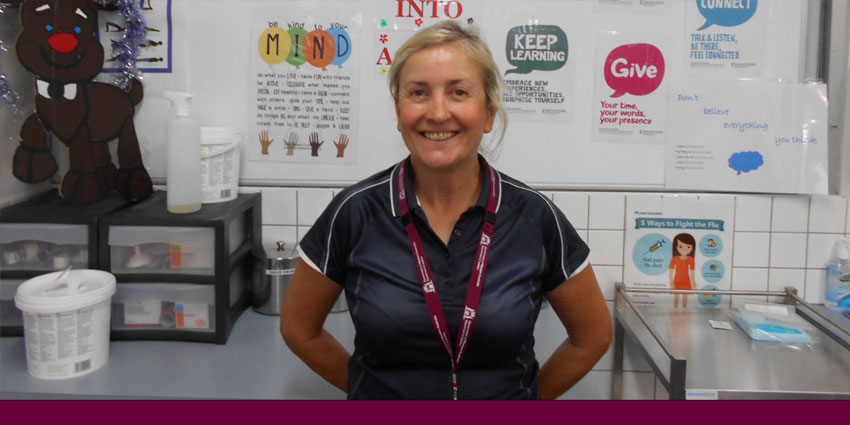
Nursing youth in custody a chance to make a big difference
As a child in a small village in Northumberland – which had Hadrians Wall going through it and where her parents and grandparents had always lived – Tracey Chandler would never have believed she would one day be nursing in faraway WA.
Nor would she have thought her patients would be young people in detention, many of them Aboriginal kids from remote communities for whom English is a second, third or fourth language.
While she has come a long way from her roots, Tracey has no regrets: “I’m glad I came to WA and I’m lucky to have the best job,” she said.
“As Acting Clinical Nurse Manager at Banksia Hill Detention Centre I’m part of a health centre team who care for boys and girls aged from 10 to 18.
“A study by Telethon Kids Institute – named the Banksia Hill Project – found that nine out of 10 our patients have severe neurodevelopmental impairment, with 36 percent found to have Fetal Alcohol Syndrome Disorder. It was the first study in Australia to assess and diagnose young people in a custodial facility for FASD.”
Tracey said she gained an understanding of brain injury from nursing brain-injured patients in the UK in a regional neurological rehabilitation centre.
“We make sure we interact with the young people in our care in ways they can understand,” she said.
Tracey and her small team of nurses assess each young person who enters detention and assures them they will be safe and cared for. Unlike adult prisons, young people are admitted to detention 24/7 as, on arrest, as they are not taken to Police lock-up.
"We have staff in the health centre all the time to check that young people coming in are fit for custody," she said. "If they're unwell they are taken to Fiona Stanley Hospital before they come back to us.
“Many of our young patients come to us in the Health Centre with sporting injuries sustained here at Banksia Hill where they are offered a wide range of sports opportunities,” she said.
“Other common ailments include head lice, toothache and ear and skin problems. Of course, many young people are often anxious and by providing them with a supportive and non-judgemental environment, they are able to talk to us about their concerns. We also educate them about contraception, sexually transmitted diseases and how to look after themselves generally.
“Our patients are mostly too young to have chronic medical conditions, although Acute Rheumatic Fever and Rheumatic Heart Disease (RHD) are diseases we see among adult prisoners and young people in WA custodial facilities.
“The young people may not be compliant in the community with their RHD injections so we make sure they are up to date with these, and with general immunisation.
“Their health improves markedly while they’re at Banksia Hill because they have access to structure and routine. They get good meals, education and the care of adults who, while they are not family, genuinely care about their wellbeing.
“It’s very rewarding. Men and women prisoners tend to take a long time to trust health professionals, but the young people are more trusting and we make sure that every interaction we have with them is meaningful. We are aware that they have suffered trauma – trauma that goes back to the Stolen Generations.
“The kids in the Banksia Beats – a band here in the centre – write lyrics that refer to this intergenerational trauma.
“We’re lucky to have a great team of nurses who look after each other. We too can suffer from vicarious trauma because some of the things we hear are shocking so it’s great we support each other.”
Tracey said she and her team also worked closely with Banksia’s Youth Custodial Officers, Aboriginal Welfare Officers, Mental Health and other external and internal agencies including the Department of Communities to provide each young person with as much care as possible.
Before joining Banksia Hill, Tracey nursed at Acacia Prison where she regularly met a group of lifers to discuss their health needs and where she had to be fast on her feet in order to get to around 500 patients every morning to provide them with their medication.
“In Banksia Hill, some of our patients regard us nurses as mother figures. Only the other day one of the children who had been released but who had reoffended waved at me from the back of the Police wagon as it drew into the sally port. You do get fairly close to some of them.
“I hope that we are also role models to these young people, and can encourage them to make the most of what they learn here to make positive differences in their lives, become productive members of society, and maybe, one day, good parents.”
If you would like to join Tracey as a nurse in one of the Department of Justice’s custodial facilities for young people or adults, visit the jobs.wa.gov.au website for advertised nursing positions in WA prisons and the detention centre. For more information about nursing in a custodial setting, contact the Coordinator of Nursing on 61 8 9334 6069.


